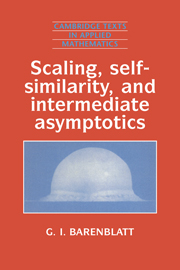3654 results in ebooks in fluid mechanics
3 - Flow in porous rocks
-
- Book:
- Flow in Porous Rocks
- Published online:
- 05 January 2015
- Print publication:
- 18 December 2014, pp 28-51
-
- Chapter
- Export citation
1 - Introduction
-
- Book:
- Flow in Porous Rocks
- Published online:
- 05 January 2015
- Print publication:
- 18 December 2014, pp 1-10
-
- Chapter
- Export citation
5 - Dispersion in porous media
-
- Book:
- Flow in Porous Rocks
- Published online:
- 05 January 2015
- Print publication:
- 18 December 2014, pp 70-91
-
- Chapter
- Export citation
8 - Fluid–rock interactions
-
- Book:
- Flow in Porous Rocks
- Published online:
- 05 January 2015
- Print publication:
- 18 December 2014, pp 128-155
-
- Chapter
- Export citation
10 - Buoyancy effects on dispersion
-
- Book:
- Flow in Porous Rocks
- Published online:
- 05 January 2015
- Print publication:
- 18 December 2014, pp 196-226
-
- Chapter
- Export citation
13 - Epilogue
-
- Book:
- Flow in Porous Rocks
- Published online:
- 05 January 2015
- Print publication:
- 18 December 2014, pp 279-280
-
- Chapter
- Export citation
References
-
- Book:
- Flow in Porous Rocks
- Published online:
- 05 January 2015
- Print publication:
- 18 December 2014, pp 281-284
-
- Chapter
- Export citation
7 - Two-phase flow
-
- Book:
- Flow in Porous Rocks
- Published online:
- 05 January 2015
- Print publication:
- 18 December 2014, pp 110-127
-
- Chapter
- Export citation
6 - Frontal instability
-
- Book:
- Flow in Porous Rocks
- Published online:
- 05 January 2015
- Print publication:
- 18 December 2014, pp 92-109
-
- Chapter
- Export citation
Preface
-
- Book:
- Flow in Porous Rocks
- Published online:
- 05 January 2015
- Print publication:
- 18 December 2014, pp ix-x
-
- Chapter
- Export citation
4 - Accounting for uncertainty
-
- Book:
- Flow in Porous Rocks
- Published online:
- 05 January 2015
- Print publication:
- 18 December 2014, pp 52-69
-
- Chapter
- Export citation
Index
-
- Book:
- Flow in Porous Rocks
- Published online:
- 05 January 2015
- Print publication:
- 18 December 2014, pp 285-289
-
- Chapter
- Export citation
9 - Gravity-driven flow in porous media
-
- Book:
- Flow in Porous Rocks
- Published online:
- 05 January 2015
- Print publication:
- 18 December 2014, pp 156-195
-
- Chapter
- Export citation

Scaling, Self-similarity, and Intermediate Asymptotics
- Dimensional Analysis and Intermediate Asymptotics
-
- Published online:
- 18 December 2014
- Print publication:
- 12 December 1996
Copyright page
-
- Book:
- Flow in Porous Rocks
- Published online:
- 05 January 2015
- Print publication:
- 18 December 2014, pp iv-iv
-
- Chapter
- Export citation
2 - Porous rocks
-
- Book:
- Flow in Porous Rocks
- Published online:
- 05 January 2015
- Print publication:
- 18 December 2014, pp 11-27
-
- Chapter
- Export citation
11 - Geothermal power and heat storage
-
- Book:
- Flow in Porous Rocks
- Published online:
- 05 January 2015
- Print publication:
- 18 December 2014, pp 227-261
-
- Chapter
- Export citation
12 - Compressibility and gas flows
-
- Book:
- Flow in Porous Rocks
- Published online:
- 05 January 2015
- Print publication:
- 18 December 2014, pp 262-278
-
- Chapter
- Export citation
Contents
-
- Book:
- Flow in Porous Rocks
- Published online:
- 05 January 2015
- Print publication:
- 18 December 2014, pp v-viii
-
- Chapter
- Export citation
14 - Address your ethical and legal responsibilities
-
- Book:
- Successful Scientific Writing
- Published online:
- 05 November 2014
- Print publication:
- 13 November 2014, pp 187-203
-
- Chapter
- Export citation
